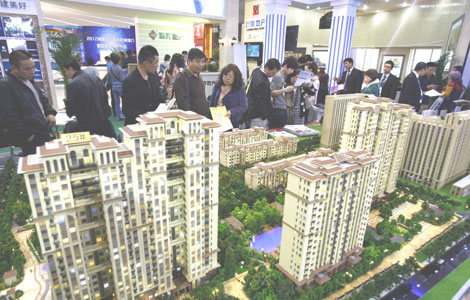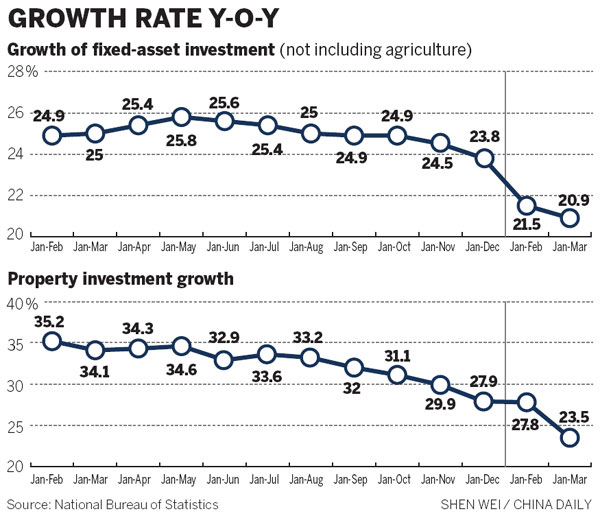 |
|
|
|
|||||||||||
|
 |
|
Visitors look at a model of a housing project at the 2012 Beijing Spring Real Estate Expo. China's property investment growth rate dropped 10.6 percentage points in the first quarter. [Photo / China Daily] |
Analysts see auspicious signs in the investment data released by the Chinese government on Friday, but warned that uncertainties related to the property sector may drag down the traditional growth engine and further dampen economic growth.
Fixed-asset investment growth in March eased to 20.9 percent year-on-year from 21.5 percent a month earlier, according to data released on Friday by the National Bureau of Statistics.
Growth in investments at local levels cooled to 23.1 percent year-on-year in March from 24 percent, while investments backed by the central government saw a sharper contraction to 9.7 percent in March, down 7.9 percentage points from a month earlier.
"Fixed-asset investment held up better than we anticipated," said Zhang Zhiwei, chief economist for China at Nomura Holdings Inc. He revised his fixed-asset investment growth forecast for 2012 to 21 percent from 19.5 percent.
"This reflects the latest policy support measures and a moderate deceleration in property investment," said Huang Yiping, chief economist for emerging Asia at the investment banking division of Barclays Bank PLC.
Property investment grew 19.6 percent year-on-year in March. In the first quarter, the growth rate stood at 23.5 percent, 10.6 percentage points lower than a year earlier, mainly due to the slowdown in ongoing housing projects.
Tang Jianwei, an economist at the Bank of Communications Ltd, said although January to March fixed-asset investment declined compared with the January to February figure, excluding price fluctuations, the real growth rate in the first quarter was actually higher than that in the first two months.
Fixed-asset investment will see faster growth in the second quarter as investments in central and western areas gains strength from favorable policies from the central government, he said.
"What's more, recovering turnover in the property market, a more relaxed capital environment for real estate developers, and accelerated construction of affordable homes will guarantee that a further decline in property investment growth in the second quarter will be moderate."
Tang predicted that property investment will grow 15 percent year-on-year in 2012, and nominal fixed-asset investment growth will remain at around 21 percent.
"Developments in the property sector remain critical for the overall economic outlook. There are some tentative signs that transactions improved in March, but it remains to be seen whether such an improvement can be sustained," Zhang said.
The property market remains weak but appears to have turned a corner, or at least reached a bottom, said Alaistair Chan, an economist at Moody's Analytics.
And a trough in the property sector could help explain the divergence between the positive outlook in official purchasing managers' surveys and the more pessimistic one conducted by HSBC, he said.
"Other domestic factors outside of housing such as a resumption in (high-speed) railway construction, steady growth in services and retail spending, and the development in inland provinces mean that growth this year will be above the government's stated 7.5 percent target," said Chan, adding that monetary stimulus will also flow through by the second half of the year and sustain growth.
Ashley Davis, Asia economist at German lender Commerzbank AG, said the bank's forecast for China's economic growth in 2012 will fall to 7.5 percent from 9.2 percent last year, mainly because of expectations of a further decrease in fixed-asset investment.
"And in the second quarter, the growth rate will continue to slow down," said Davis.
wangxiaotian@chinadaily.com.cn
